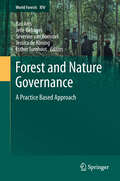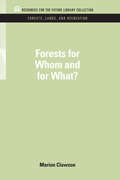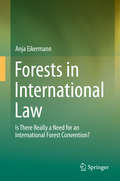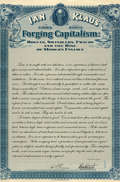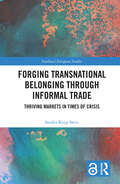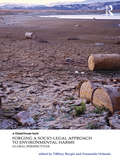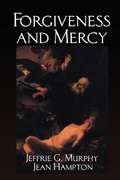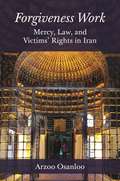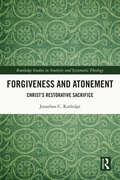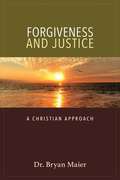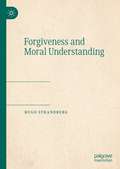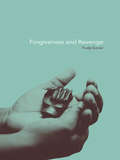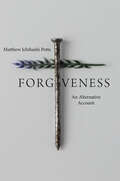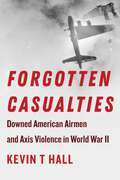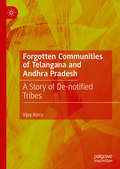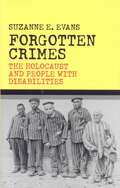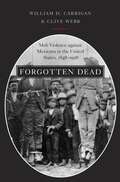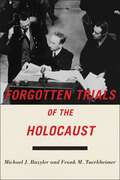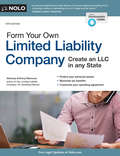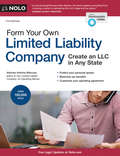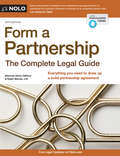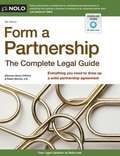- Table View
- List View
Forest and Nature Governance
by Jelle Behagel Bas Arts Jessica De Koning Esther Turnhout Séverine Van BommelToday, problems such as deforestation, biodiversity loss and illegal logging have provoked various policy responses that are often referred to as forest and nature governance. In its broadest interpretation, governance is about the many ways in which public and private actors from the state, market and/or civil society govern public issues at multiple scales. This book takes a fresh perspective on the study of forest and nature governance. Departing from 'practice theory', and building upon scholars like Giddens, Bourdieu, Reckwitz, Schatzki and Callon, it seeks to move beyond established understandings of institutions, actors, and knowledge. In so doing, it not only presents an innovative conceptual and methodological framework for a practice based approach, but also rich case studies and ethnographies. Finally, this book is about how actors involved in governance talk about and work with trees, forests, biodiversity, wildlife, and so on, while acting upon forest policies, environmental discourses, codes of conduct, or scientific insights.
Forests for Whom and for What? (RFF Forests, Lands, and Recreation Set)
by Marion ClawsonClawson is concerned here not so much with what forest policy should be, but more with the criteria by which it should be determined. He lists such questions as how much land to devote to forests, how much timber to harvest and the best means of harvesting it, and the compatibility or incompatibility of forest uses as the issues to be dealt with in formulating forest policy. Originally published in 1975
Forests in International Law
by Anja EikermannThis book investigates the potential need for an international convention on forests and establishes a multifunctional concept of forests as a cornerstone for international forest regulation. Accordingly, it examines a variety of international instruments pertaining directly or indirectly to forests and explores their entangled, fragmented nature. While contending that the lack of consistency in international law impedes the development of a stand-alone international forest convention, at the same time it argues that the lessons learned from fragmentation as well as from the history of forest discourse on the international level open up new options for the regulation of forests in international law, based on (new) concepts of coordination and cooperation.
Forging Capitalism
by Ian KlausVice is endemic to Western capitalism, according to this fascinating, wildly entertaining, often startling history of modern finance. Ian Klaus's Forging Capitalism demonstrates how international financial affairs in the nineteenth century were conducted not only by gentlemen as a noble pursuit but also by connivers, thieves, swindlers, and frauds who believed that no risk was too great and no scheme too outrageous if the monetary reward was substantial enough. Taken together, the grand deceptions of the ambitious schemers and the determined efforts to guard against them have been instrumental in creating the financial establishments of today. In a story teeming with playboys and scoundrels and rich in colorful and amazing events, Klaus chronicles the evolution of trust through three distinct epochs: the age of values, the age of networks and reputations, and, ultimately, in a world of increased technology and wealth, the age of skepticism and verification. In today's world, where the questionable dealings of large international financial institutions are continually in the spotlight, this extraordinary history has great relevance, offering essential lessons in both the importance and the limitations of trust.
Forging Transnational Belonging through Informal Trade: Thriving Markets in Times of Crisis (Southeast European Studies)
by Sandra King-SavicAnalyzing informal trading practices and smuggling through the case study of Novi Pazar, this book explores how societies cope when governments no longer assume the responsibility for providing welfare to their citizens. How do economic transnational practices shape one’s sense of belonging in times of crisis/precarity? Specifically, how does the collapse of the Ottoman Empire – and the subsequent migration of the Muslim Slav population to Turkey – relate to the Yugoslav Succession Wars during the 1990s? Using the case study of Novi Pazar, a town in Serbia that straddles the borders of Montenegro, Serbia and Kosovo that became a smuggling hub during the Yugoslav conflict, the book focuses on that informal market economy as a prism through which to analyze the strengthening of existing relations between the émigré community in Turkey and the local Bosniak population in the Sandžak region. Demonstrating the interactive nature of relations between the state and local and émigré communities, this book will be of interest to scholars and students interested in Southeastern Europe or the Yugoslav Succession Wars of the 1990s, as well as social anthropologists who are working on social relations and deviant behavior.
Forging a Convention for Crimes against Humanity
by Leila Nadya SadatCrimes against humanity were one of the three categories of crimes elaborated in the Nuremberg Charter. However, unlike genocide and war crimes, they were never set out in a comprehensive international convention. This book represents an effort to complete the Nuremberg legacy by filling this gap. It contains a complete text of a proposed convention on crimes against humanity in English and in French, a comprehensive history of the proposed convention, and fifteen original papers written by leading experts on international criminal law. The papers contain reflections on various aspects of crimes against humanity, including gender crimes, universal jurisdiction, the history of codification efforts, the responsibility to protect, ethnic cleansing, peace and justice dilemmas, amnesties and immunities, the jurisprudence of the ad hoc tribunals, the definition of the crime in customary international law, the ICC definition, the architecture of international criminal justice, modes of criminal participation, crimes against humanity and terrorism, and the inter-state enforcement regime. "
Forging a Socio-Legal Approach to Environmental Harms: Global Perspectives (Law, Justice and Ecology)
by Tiffany Bergin Emanuela OrlandoEnvironmental harms exert a significant toll and pose substantial economic costs on societies around the world. Although such harms have been studied from both legal and social science perspectives, these disciplinary-specific approaches are not, on their own, fully able to address the complexity of these environmental challenges. Many legal approaches, for example, are limited by their inattention to the motivations behind environmental offences, whereas many social science approaches are hindered by an insufficient grounding in current legislative frameworks. This edited collection constitutes a pioneering attempt to overcome these limitations by uniting legal and social science perspectives. Together, the book’s contributors forge an innovative socio-legal approach to more effectively respond to, and to prevent, environmental harms around the world. Integrating theoretical and empirical work, the book presents carefully selected illustrations of how legal and social science scholarship can be brought together to improve policies. The various chapters examine how a socio-legal approach can ultimately lead to a more comprehensive understanding of environmental harms, as well as to innovative and effective responses to such environmental offences.
Forgiveness
by Vladimir JankélévitchPhilosopher Vladimir Jankélévitch has only recently begun to receive his due from the English-speaking world, thanks in part to discussions of his thought by Jacques Derrida, Emmanuel Lévinas, and Paul Ricoeur. His international readers have long valued his unique, interdisciplinary approach to philosophy’s greatest questions and his highly readable writing style. Originally published in 1967, Le Pardon, or Forgiveness, is one of Jankélévitch’s most influential works. In it, he characterizes the ultimate ethical act of forgiving as behaving toward the perpetrator as if he or she had never committed the action, rather than merely forgetting or rationalizing it—a controversial notion when considering events as heinous as the Holocaust. Like so many of Jankélévitch’s works, Forgiveness transcends standard treatments of moral problems, not simply generating a treatise on one subject but incorporating discussions of topics such as free will, giving, creativity, and temporality. Translator Andrew Kelley masterfully captures Jankélévitch’s melodic prose and, in a substantive introduction, reviews his life and intellectual contributions. Forgiveness is an essential part of that legacy, and this indispensable English translation provides key tools for understanding one of the great Western philosophers of the twentieth century.
Forgiveness And Mercy (Cambridge Studies In Philosophy And Law)
by Joseph Raz Philip Pettit Jeremy Waldron David Lyons Jeffrie G. Murphy Jules Coleman Antony Duff Jean Hampton Gerald Postema Neil MacCormick Stephen R. MunzerThis book focuses on the degree to which certain moral and legal doctrines are rooted in specific passions that are then institutionalized in the form of criminal law. A philosophical analysis is developed of the following questions: When, if ever, should hatred be overcome by sympathy or compassion? What are forgiveness and mercy and to what degree do they require--both conceptually and morally--the overcoming of certain passions and the motivation by other passions? If forgiveness and mercy indeed are moral virtues, what role, if any, should they play in the law?
Forgiveness Work: Mercy, Law, and Victims' Rights in Iran
by Arzoo OsanlooA remarkable look at an understudied feature of the Iranian justice system, where forgiveness is as much a right of victims as retributionIran’s criminal courts are notorious for meting out severe sentences—according to Amnesty International, the country has the world’s highest rate of capital punishment per capita. Less known to outside observers, however, is the Iranian criminal code’s recognition of forgiveness, where victims of violent crimes, or the families of murder victims, can request the state to forgo punishing the criminal. Forgiveness Work shows that in the Iranian justice system, forbearance is as much a right of victims as retribution. Drawing on extended interviews and first-hand observations of more than eighty murder trials, Arzoo Osanloo explores why some families of victims forgive perpetrators and how a wide array of individuals contribute to the fraught business of negotiating reconciliation.Based on Qur’anic principles, Iran’s criminal codes encourage mercy and compel judicial officials to help parties reach a settlement. As no formal regulations exist to guide those involved, an informal cottage industry has grown around forgiveness advocacy. Interested parties—including attorneys, judges, social workers, the families of victims and perpetrators, and even performing artists—intervene in cases, drawing from such sources as scripture, ritual, and art to stir feelings of forgiveness. These actors forge new and sometimes conflicting strategies to secure forbearance, and some aim to reform social attitudes and laws on capital punishment.Forgiveness Work examines how an Islamic victim-centered approach to justice sheds light on the conditions of mercy.
Forgiveness and Atonement: Christ’s Restorative Sacrifice (Routledge Studies in Analytic and Systematic Theology)
by Jonathan Curtis RutledgeThis book analyzes the relationship between forgiveness, atonement, and reconciliation from a Christian theological perspective. Drawing on both theological and philosophical literature, it addresses the problem of whether atonement is required for forgiveness and considers important related concepts such as sin and justice. The author develops a sacrificial model of atonement that connects an understanding of Christian forgiveness with the biblical narrative of Christ’s sacrifice and makes reconciliation between God and humanity possible. Offering a fresh and coherent argument, the book will be relevant to scholars of Christian theology, biblical studies, and the philosophy of religion.
Forgiveness and Justice: A Christian Approach
by Bryan MaierForgiveness and Justice is extremely useful for any practitioner needing to form a useful, theologically sound understanding of forgiveness for those who come for help.
Forgiveness and Moral Understanding
by Hugo StrandbergThis book sets out to deepen our moral understanding by thinking about forgiveness: what does it mean for our understanding of morality that there is such a thing as forgiveness? Forgiveness is a challenge to moral philosophy, for forgiveness challenges us: it calls me to understand my relations to others, and thereby myself, in a new way. Without arguing for or against forgiveness, the present study tries to describe these challenges. These challenges concern both forgiving and asking for forgiveness. The latter is especially important in this context: what does the need to be forgiven mean? In the light of such questions, central issues in the philosophy of forgiveness are critically discussed, about the reasons and conditions for forgiveness, but mostly the focus is on new questions, about the relation of forgiveness to plurality, virtue, death, the processes of moral change and development, and the possibility of feeling at home in the world.
Forgiveness and Retribution
by Margaret R. HolmgrenForgiveness and Retribution: Responding to Wrongdoing argues that ultimately, forgiveness is always the appropriate response to wrongdoing. In recent decades, many philosophers have claimed that unless certain conditions are met, we should resent those who have wronged us personally and that criminal offenders deserve to be punished. Conversely, Margaret Holmgren posits that we should forgive those who have ill-treated us, but only after working through a process of addressing the wrong. Holmgren then reflects on the kinds of laws and social practices a properly forgiving society would adopt.
Forgiveness and Revenge
by Trudy GovierForgiveness and Revenge is a powerful exploration of our attitudes to serious wrongdoings and a careful examination of the values that underlie our thinking about revenge and forgiveness.From adulterous spouses to terrorist factions, we are surrounded by wrongdoing, yet we rarely agree which response is appropriate. The problem of how to respond realistically and sensitively to the wrongs of the past remains a perplexing one. Trudy Govier clarifies our thinking on this subject by examining the moral and practical impact of revenge and forgiveness, both personal and political.Forgiveness and Revenge offers much-needed clarity and reason where emotions often prevail. It is essential reading for anyone interested in the ethics of attitudes to wrongdoing.
Forgiveness: An Alternative Account
by Matthew Ichihashi PottsA deeply researched and poignant reflection on the practice of forgiveness in an unforgiving world Matthew Ichihashi Potts explores the complex moral terrain of forgiveness, which he claims has too often served as a salve to the conscience of power rather than as an instrument of healing or justice. Though forgiveness is often linked with reconciliation or the abatement of anger, Potts resists these associations, asserting instead that forgiveness is simply the refusal of retaliatory violence through practices of penitence and grief. It is an act of mourning irrevocable wrong, of refusing the false promises of violent redemption, and of living in and with the losses we cannot recover. Drawing on novels by Kazuo Ishiguro, Marilynne Robinson, Louise Erdrich, and Toni Morrison, and on texts from the early Christian to the postmodern, Potts diagnoses the real dangers of forgiveness yet insists upon its enduring promise. Sensitive to the twenty-first-century realities of economic inequality, colonial devastation, and racial strife, and considering the role of forgiveness in the New Testament, the Christian tradition, philosophy, and contemporary literature, this book heralds the arrival of a new and creative theological voice.
Forgotten Casualties: Downed American Airmen and Axis Violence in World War II (World War II: The Global, Human, and Ethical Dimension)
by Kevin T HallSheds new light on the mistreatment of downed airmen during World War II and the overall relationship between the air war and state-sponsored violence.Throughout the vast expanse of the Pacific, the remoteness of Southeast Asia, and the rural and urban communities in Nazi-occupied Europe, more than 120,000 American airmen were shot down over enemy territory during World War II, thousands of whom were mistreated and executed. The perpetrators were not just solely fanatical soldiers or Nazi zealots but also ordinary civilians triggered by the death and devastation inflicted by the war. In Forgotten Casualties, author Kevin T Hall examines Axis violence inflicted on downed Allied airmen during this global war.Compared with all other armed conflicts, World War II exhibited the most widespread and ruthless violence committed against airmen. Flyers were deemed guilty because of their association with the Allied air forces, and their fate remained in the hands of their often-hostile captors. Axis citizens angered by the devastation inflicted by the war, along with the regimes’ consent and often encouragement of citizens to take matters into their own hands, resulted in thousands of Allied flyers’ being mistreated and executed by enraged civilians. Written to help advance the relatively limited discourse on the mistreatment against flyers in World War II, Forgotten Casualties is the first book to analyze the Axis violence committed against Allied airmen in a comparative, international perspective. Effectively comparing and contrasting the treatment of POWs in Germany with that of their counterparts in Japan, Hall’s thorough analysis of rarely seen primary and secondary sources sheds new light on the largely overlooked complex relationship among the air war, propaganda, the role of civilians, and state-sponsored terror during the radicalized conflict. Sources include postwar trial testimonies, Missing Air Crew Reports (MACR), Escape and Evasion reports, perpetrators’ explanations and rationalizations for their actions, extensive judicial sources, transcripts of court proceedings, autopsy reports, appeals for clemency, and justifications for verdicts.Drawing heavily on airmen’s personal accounts and the testimonies of both witnesses and perpetrators from the postwar crimes trials, Forgotten Casualties offers a new narrative of this largely overlooked aspect of Axis violence.
Forgotten Communities of Telangana and Andhra Pradesh: A Story of De-notified Tribes
by Vijay KorraThe book discusses the socio-cultural-historical, occupational, educational, employment and discriminatory status of one of the most neglected and marginalised communities: the de-notified tribes or ex-criminal tribes of Telangana and Andhra Pradesh. Based on primary data collected from 14 communities in 11 districts in these states, it discusses the current state of affairs concerning de-notified tribes. There is no accurate and comprehensive information available on the present socio-economic status of these communities, either in the literature or with government agencies. This book provides valuable information on how they are faring in post-independence India since their de-notification from the Criminal Tribes Act, 1871.
Forgotten Crimes: The Holocaust And People With Disabilities
by Suzanne E. EvansBetween 1939 and 1945 the Nazi regime systematically murdered hundreds of thousands of children and adults with disabilities as part of its "euthanasia" programs. These programs were designed to eliminate all persons with disabilities who, according to Nazi ideology, threatened the health and purity of the German race. Forgotten Crimes explores the development and workings of this nightmarish process, a relatively neglected aspect of the Holocaust. Suzanne Evans's account draws on the rich historical record as well as scores of exclusive interviews with disabled Holocaust survivors. It begins with a description of the Nazis' Children's Killing Program, in which tens of thousands of children with mental and physical disabilities were murdered by their physicians, usually by starvation or lethal injection. The book goes on to recount the T4 euthanasia program, in which adults with disabilities were disposed of in six official centers, and the development of the Sterilization Law that allowed the forced sterilization of at least a half-million young adults with disabilities. Ms. Evans provides portraits of the perpetrators and accomplices of the killing programs, and investigates the curious role of Switzerland's rarely discussed exclusionary immigration and racially eugenic policies. Finally, Forgotten Crimes notes the inescapable implications of these Nazi medical practices for our present-day controversies over eugenics, euthanasia, genetic engineering, medical experimentation, and rationed health care.
Forgotten Dead: Mob Violence Against Mexicans in the United States, 1848-1928
by William D. Carrigan Clive WebbMob violence in the United States is usually associated with the southern lynch mobs who terrorized African Americans during the Jim Crow era. <p><p>In Forgotten Dead, William D. Carrigan and Clive Webb uncover a comparatively neglected chapter in the story of American racial violence, the lynching of persons of Mexican origin or descent. Over eight decades lynch mobs murdered hundreds of Mexicans, mostly in the American Southwest. Racial prejudice, a lack of respect for local courts, and economic competition all fueled the actions of the mob. Sometimes ordinary citizens committed these acts because of the alleged failure of the criminal justice system; other times the culprits were law enforcement officers themselves. Violence also occurred against the backdrop of continuing tensions along the border between the United States and Mexico aggravated by criminal raids, military escalation, and political revolution.
Forgotten Trials of the Holocaust
by Michael J. Bazyler Frank M. TuerkheimerIn the wake of the Second World War, how were the Allies torespond to the enormous crime of the Holocaust? Even in an ideal world, itwould have been impossible to bring all the perpetrators to trial.Nevertheless, an attempt was made to prosecute some. This book uncovers ten “forgotten trials” of the Holocaust,selected from the many Nazi trials that have taken place over the course of thelast seven decades. It showcases how perpetrators of the Holocaust were dealtwith in courtrooms around the world, revealing how differentlegal systems responded to the horrors of the Holocaust. The book provides agraphic picture of the genocidal campaign against the Jews through eyewitnesstestimony and incriminating documents and traces how the public memory of theHolocaust was formed over time.
Form Your Own Limited Liability Company
by Anthony MancusoMake your business an LLC. Structuring your business as an LLC can bring important advantages: It lets you limit your personal liability for business debts and simplify your taxes. Here, you’ll find the key legal forms you need to create an LLC in your state, including: LLC articles of organization, Operating agreement for member-managed LLC, LLC management operating agreement, LLC reservation of name letter, Minutes of meeting form Form Your Own Limited Liability Company has easy-to-understand instructions, including how to create an operating agreement that covers how profits and losses are divided and major business decisions are made. You’ll also learn how to choose a unique LLC name that meets state legal requirements and how to take care of ongoing legal and tax paperwork. This new edition of has been carefully revised and updated to reflect the latest federal regulations, as well as the most current laws of all 50 states. Plus, all the forms you need are included. Interactive forms are downloadable. This book covers only United States law, unless it specifically states otherwise.
Form Your Own Limited Liability Company: Create An LLC in Any State
by Anthony MancusoMake your business an LLC Structuring your business as an LLC can bring important advantages: It lets you limit your personal liability for business debts and simplify your taxes. Here, you’ll find the key legal forms you need to create an LLC in your state, including: LLC articles of organization operating agreement for member-managed LLC operating agreement for manager-managed LLC LLC reservation of name letter, and minutes of meeting form. Form Your Own Limited Liability Company has easy-to-understand instructions, including how to create an operating agreement that covers how profits and losses are divided and major business decisions are made. You’ll also learn how to choose a unique LLC name that meets state legal requirements and how to take care of ongoing legal and tax paperwork. This edition is completely revised to reflect the latest federal and state laws.
Form a Partnership: The Complete Legal Guide
by Ralph Warner Denis CliffordEverything you and your partners need to go into business together! Form a Partnership thoroughly explains the legal and practical issues involved in forming a business partnership, creating a partnership agreement and protecting each person's interests. In plain English, the book covers: partnerships compared to other business structures the financial and tax liability of partners contributions of cash, property and services what happens if a partner wants out how to value partnership assets admitting new partners buying out a partner's interest limited partnerships and much more. This edition of Form a Partnership is totally revised and updated to reflect the law and realities of today's business world. Plus, all the forms you need to create a partnership agreement are provided.
Form a Partnership: The Complete Legal Guide
by Ralph Warner Dennis CliffordEverything you and your partners need to go into business together! Form a Partnership thoroughly explains the legal and practical issues involved in forming a business partnership, creating a partnership agreement and protecting each person's interests. In plain English, the book covers: <P> * partnerships compared to other business structures<P> * the financial and tax liability of partners<P> * contributions of cash, property and services<P> * what happens if a partner wants out<P> * how to value partnership assets<P> * admitting new partners<P> * buying out a partner's interest<P> * limited partnerships <P> * and much more<P> This edition of Form a Partnership is totally revised and updated to reflect the law and realities of today's business world. Plus, all the forms you need to create a partnership agreement are provided.
